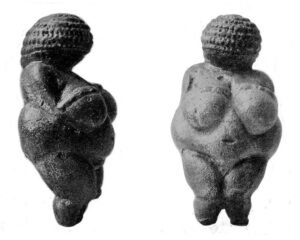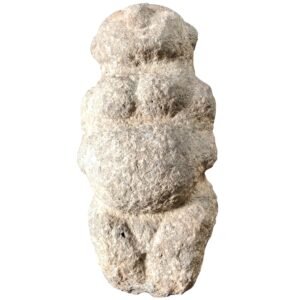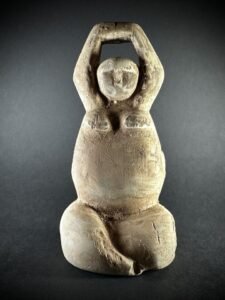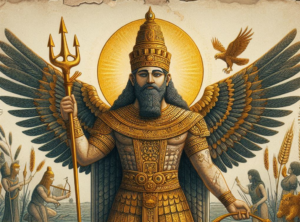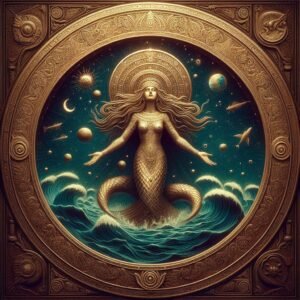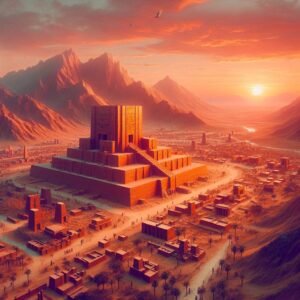The suppression and defacing of the divine feminine appears to have begun as part of cultural and religious shifts associated with societal transitions from egalitarian or matrilineal societies to more hierarchical and patriarchal ones.
Category: Assyrian Mythology
Permanent link to this article: https://truthofself.com/when-did-the-suppression-of-the-divine-feminine-begin/
Permanent link to this article: https://truthofself.com/understanding-of-the-divine-nature-of-the-hiding-of-the-divine-feminine-in-history/
Mar 26
From Mother to Father – A Spiritual Gender Dominance Shift?
The hypothesis of a historical shift from feminine dominance to masculine dominance in spiritual and religious expression is a widely discussed idea in anthropology, archaeology, and religious studies. While it remains a topic of debate, there is considerable evidence suggesting a gradual transition in spiritual focus and societal structures over millennia.
Permanent link to this article: https://truthofself.com/from-mother-to-father-a-spiritual-gender-dominance-shift/
Jul 14
The God Marduk
Permanent link to this article: https://truthofself.com/the-god-marduk/
Jul 13
The Goddess Ninsun
Ninsun, also known as Ninsumun, was a Mesopotamian goddess revered for her wisdom, beauty, and maternal care. She is best known as the mother of Gilgamesh, the hero of the Epic of Gilgamesh, and the wife of the deified king Lugalbanda. Ninsun’s name, which means “Lady of the Wild Cows,” reflects her association with bovine qualities, symbolizing nurturing and fertility.
Permanent link to this article: https://truthofself.com/the-goddess-ninsun/
Jul 13
The Goddess Ninlil
Permanent link to this article: https://truthofself.com/the-goddess-ninlil/
Jul 13
The God Utu
Permanent link to this article: https://truthofself.com/the-god-utu/
Jul 13
The God Ninurta
Permanent link to this article: https://truthofself.com/the-god-ninurta/
Jul 13
The Goddess Ereshkigal
Ereshkigal is a prominent figure in Mesopotamian mythology, known as the goddess of the underworld. Her name translates to “Queen of the Great Earth” or “Lady of the Great Place.” She rules over the land of the dead, often referred to as Kur or Irkalla, and is responsible for keeping the dead within her realm and preventing the living from entering.
Permanent link to this article: https://truthofself.com/the-goddess-ereshkigal/
Jul 13
The Igigi lesser gods
The term “Igigi” refers to a group of mythological figures in Mesopotamian mythology. They are often considered the younger gods who served the Anunnaki, the major deities. According to the Atrahasis myth, the Igigi were tasked with laborious work for the Anunnaki until they eventually rebelled due to the harsh conditions.
Permanent link to this article: https://truthofself.com/the-igigi-lesser-gods/
Jul 12
The Sumerian cosmology
The Sumerian cosmology is a fascinating blend of mythology and early scientific thought. The Sumerians envisioned the universe as a closed dome surrounded by a primordial saltwater sea. The earth was seen as a flat disc beneath this dome, with an underworld and a freshwater ocean called the Abzu beneath it.
Permanent link to this article: https://truthofself.com/the-sumerian-cosmology/
Jul 12
The Goddess Ishtar
Ishtar, known as Inanna in Sumerian, is a deity of profound complexity and significance in Mesopotamian mythology, embodying the dualities of existence such as love and war, fertility and desolation. Her worship spanned across the ancient Near East, marking her as one of the most venerated figures in early human civilization
Permanent link to this article: https://truthofself.com/the-goddess-ishtar/
Jul 12
The Goddess Nammu
Nammu is a primordial goddess in Sumerian mythology, often associated with the creation of the universe and humanity. She embodies the primeval waters, an elemental force from which life and the pantheon of gods emerged. As a creator deity, Nammu’s role is pivotal in the cosmogony of Mesopotamian belief systems, where she is revered as the mother who gave birth to the major deities, including Enki, the god of wisdom, water, and creation.
Permanent link to this article: https://truthofself.com/the-goddess-nammu/
Jul 12
The God Enki
Permanent link to this article: https://truthofself.com/the-god-enki/
Jul 12
The God Anu
Permanent link to this article: https://truthofself.com/the-god-anu/
Jul 12
The Citadel of Erbil
Permanent link to this article: https://truthofself.com/the-citadel-of-erbil/
Permanent link to this article: https://truthofself.com/the-beliefs-of-ancient-mesopotamia/

